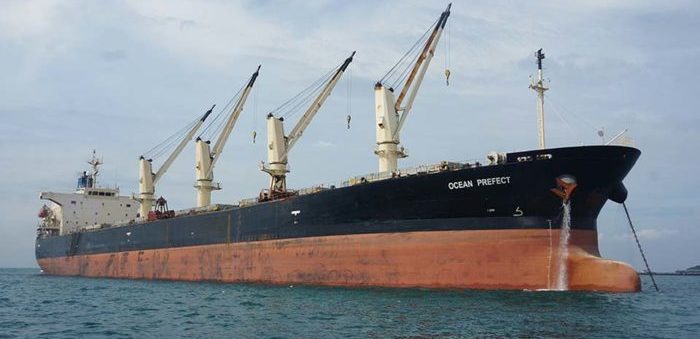UK MAIB released a report about the accident involving the bulk carrier Ocean Perfect. On 10 June 2017, the UK registered Ocean Prefect grounded when approaching Ahmed Bin Rashid Port, in Umm Al Qaywayn, United Arab Emirates. The vessel was not damaged and was re-floated 12 hours later. During a second attempted entry into the port the following day, Ocean Prefect again grounded but the vessel continued to its berth. There were no injuries or pollution.
The incident
The UK registered bulk carrier Ocean Prefect had arrived in the Arabian Gulf from Richards Bay, South Africa, loaded with 50649t of coal. The vessel had discharged 15000t of coal at Mina Saqr between 7 and 9 June 2017 before proceeding to Umm Al Qaywayn to discharge the remainder of its cargo.
On 10 June 2017, Ocean Prefect had weighed anchor off Umm Al Qaywayn2, UAE and was heading towards the pilot embarkation position
in preparation for entering Ahmed Bin Rashid Port.
When the vessel passed between No.1 and No.2 buoys the pilot steadied the vessel on a heading of 167º. The engine telegraph was at ‘slow ahead’ and the vessel was making good 4.2kts5. A little later, the echo sounder alarm activated. The depth displayed on the echo sounder, which was set to show ‘depth below the keel’, was 1.8m. The pilot advised that he may have to reduce speed. He knew the vessel’s speed in relation to its ability to slow down as it approached the berth.
Ocean Prefect’s master and the pilot were discussing the timing of slack water when the echo sounder alarm again activated. The pilot asked for Ocean Prefect’s speed and was informed by the second officer that it was 1.1kts. The master added that the vessel was probably aground. The bulk carrier was re-floated 45 minutes later.
On 11 June, Ocean Prefect had weighed anchor and had started to proceed at slow speed towards the approach channel. There was an exchange across the bridge between the pilot and the berthing pilot about changing the heading to starboard. Seconds later, shuddering and heavy vibration was felt on board the bulk carrier and the vessel’s speed reduced for a few seconds to less than 3kts.
[smlsubform prepend=”GET THE SAFETY4SEA IN YOUR INBOX!” showname=false emailtxt=”” emailholder=”Enter your email address” showsubmit=true submittxt=”Submit” jsthanks=false thankyou=”Thank you for subscribing to our mailing list”]
Ocean Prefect continued towards its berth and the pilot requested assistanc. The chief officer sounded the forward tanks and identified that No 1, 2 and 3 port ballast tanks were flooding. A little later, Ocean Prefect was secured alongside its berth, and the cargo discharge started 2 hours later.
Probable cause
After conducting an investigation on the accident, UK MAIB concluded to the following:
- The pilots had very limited local knowledge;
- The effect of a tidal set was contributory to both groundings;
- Tidal stream data for the port’s approaches was very limited;
- The positions of the navigation marks used to indicate the limits of the port’s approach channel were potentially misleading;
- The port in Umm Al Qaywayn lacked resource and marine expertise.
Recommendations
The Government of Umm Al Qaywayn awarded a concession to the Hong Kong based port operators, Hutchison Ports, to operate the container and bulk terminal facility at Ahmed Bin Rashid Port in Umm Al Qaywayn (UAQ).
The Port Authority has agreed with the UAE Transport Authority the following:
- Pilotage for vessels calling at the container and bulk terminal facility will be arranged only through the port authority.
- The port authority will provide navigational information to visiting vessels.
- Leading lights will be established in the approach channel.
- Vessel movements will be controlled and a port control facility will be established.
- A hydrographic survey of the port and its approaches will be conducted.
- Navigational aids will be upgraded.
V. Ships (Asia) Private Limited issued a safety bulletin detailing the circumstances of Ocean Prefect’s groundings in Umm Al Qaywayn, which included the following lessons:
- The master / Bridge Team must be aware that the Pilot orders are for consideration and where appropriate, they should challenge the Pilot as required to ensure the safety of the vessel.
- Chart data for harbour approaches and for critical areas of navigation have to be taken as accurate. However, consideration should be given to local port conditions where silting or other natural phenomenon’s are known to exist which affects the accuracy of the chart data.
- When calling at the port of Umm Al Qaywayn, Master pilot exchange should discuss this issue.
Seeing the above actions, UK MAIB did not issue any recommendations.
You can learn more information about the accident here






























































